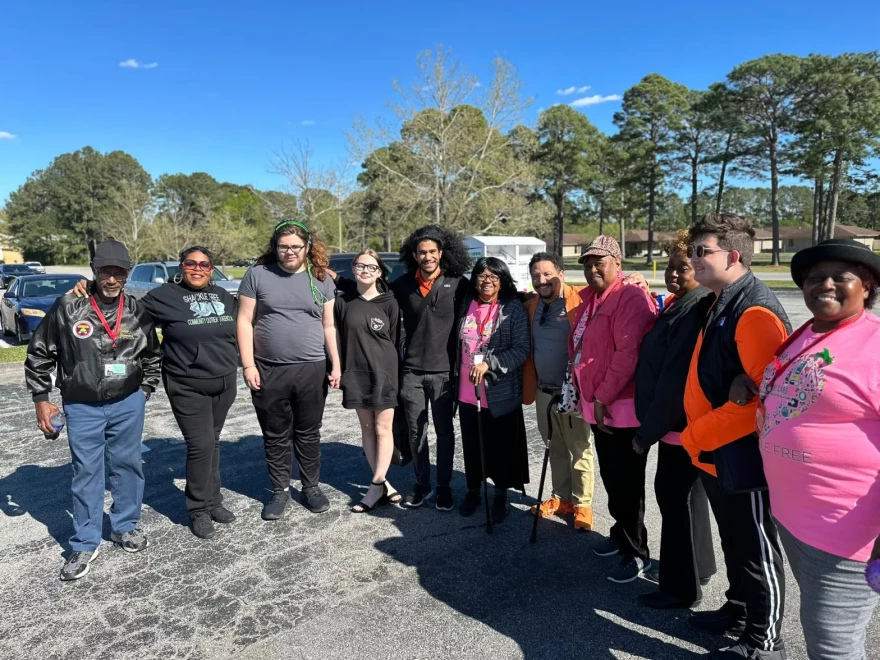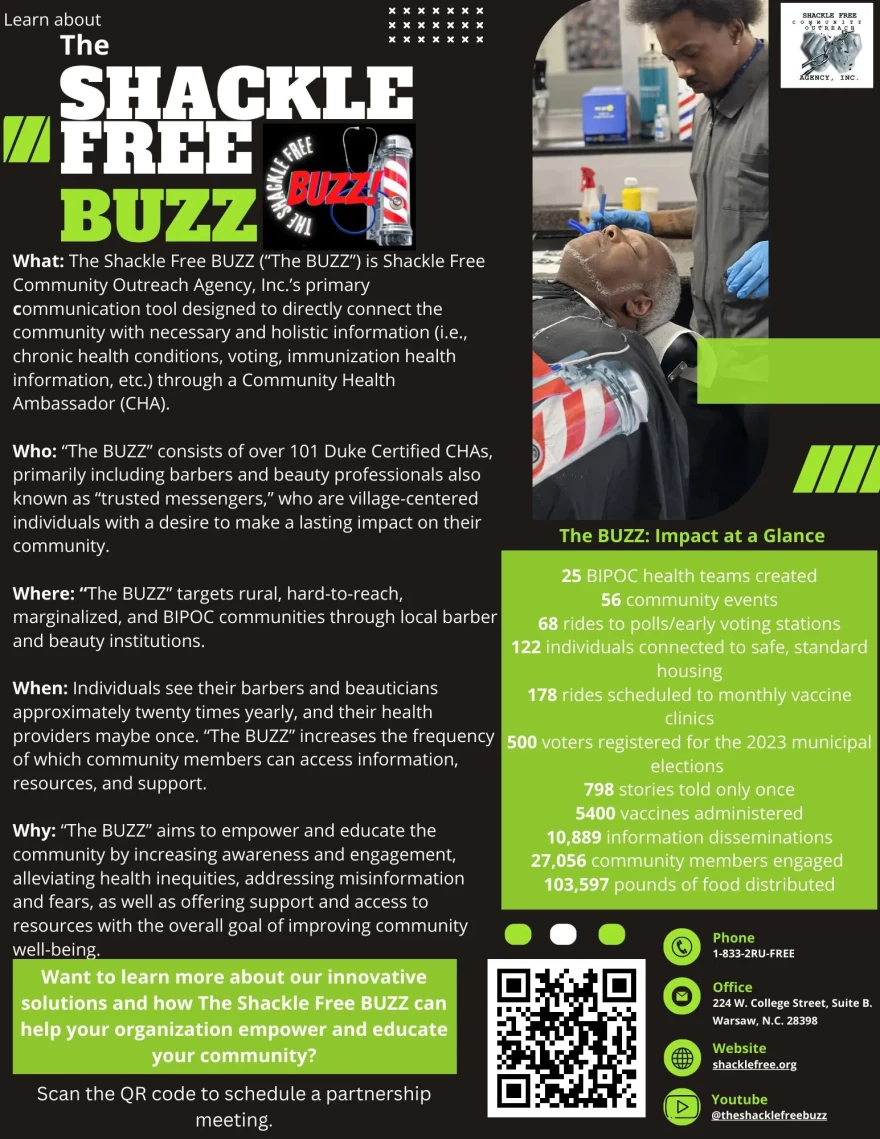In an ongoing effort to get essential health information to people in nontraditional settings, one organization in eastern North Carolina is using an approach that empowers their community’s trusted voices.
Shackle Free Community Outreach Agency helps train barbers and beauticians to share important information on vaccines and chronic disease prevention and treatment. They also share information about accessing food, housing and other resources.
The program, known as Shackle Free Buzz or “The Buzz,” is active in five counties — Duplin, Jones, Onslow, Pender and Sampson.
For the organization’s founder and Executive Director Chiquitta Lesene, teaming up with barbers and beauticians to promote health made a lot of sense.
“You see them more often than you see a physician,” Lesene said. “What we found out was, a lot of times, people share their health conditions to a trusted messenger — like their barber.”
Over the past few years, Shackle Free has developed a strong community health workforce in eastern North Carolina, with a focus on reaching rural communities of color where barriers to accessing health care persist, Lesene said. In 2021, the organization partnered with the Duke Cancer Institute Office of Health Equity to provide training on how to distribute information about cancers, diabetes, hypertension and other chronic diseases. Through the session, participants earned community health ambassador certification. Forty-one of the 101 Shackle Free community advocates who attended the four-hour training sessions were barbers and beauticians, Lesene said.
“It’s the largest organization that we have trained,” said Angelo Moore, the former director in the Duke office who designed and oversaw the training. In April, Moore became executive director of the North Carolina A&T State University Center of Excellence for Integrative Health Disparities and Equity Research.
Once trained, the barbers and beauticians return to their communities equipped with additional knowledge and skills that can complement many of the conversations they’re already having with the clients in their chairs.
“We did this to let people know how efficient it is…to utilize our barbers and beauticians to empower our communities,” Lesene said.
Getting going
Shackle Free was started in April 2019, but getting it off the ground was not an easy lift. One of the first things Lesene noticed after starting Shackle Free was the lack of comprehensive options to address people’s health and their social needs.
“Everything is pretty much in siloes, and nobody’s working together, nobody’s talking to each other,” she said.
The organization is primarily financed through grants. During the first year, though, funding was mostly out-of-pocket as Lesene and her colleagues worked hard to secure small grants, often for just a few thousand dollars.
Then, as the COVID-19 pandemic raged, Shackle Free played a key role in ensuring vaccine access in communities of color in eastern North Carolina. Data from the pandemic’s early months in North Carolina show that Black people were dying from COVID-19 at higher rates than non-Hispanic white people. Positive cases in Hispanic and Latino people were more than two times more common than for non-Hispanic people. This prompted state health leaders to tailor vaccine outreach to communities most harmed by the pandemic.

Shackle Free Community Outreach Agency
/
via NC Health News
Lesene, pictured second from left, alongside a group of community health ambassadors from Shackle Free.
Shackle Free was one of 21 organizations selected in late 2021 by Healthier Together, a public-private partnership between the state Department of Health and Human Services and NC Counts Coalition, to help with COVID vaccine outreach efforts and to continue to provide access to testing and personal protective equipment. The effort was led in conjunction with barbers and beauticians, who shared information about COVID-19, the vaccine and its efficacy.
The organization received a grant in 2023 from US Aging’s Aging & Disability Vaccination Collaborative to help set up community vaccine events in the five-county area. With the assistance of community health providers, Shackle Free helped organize the administration of 5,400 vaccinations for COVID and flu.
Shackle Free used some grant funding to set up tablets with short health and social needs screening questionnaires in a handful of barbershops. Questions addressed vaccine hesitancy, chronic health conditions, domestic violence and social needs such as housing stability and food security. Clients would then be given the option to reach out to a community health ambassador who could connect them with resources.
Building off this work, in 2024, Shackle Free received a $600,000 grant from the N.C. Department of Information Technology to promote digital equity, their largest grant to date. Part of this money, according to Lesene, will be used to put computers in barbershops and beauty salons. People will be able to check emails or attend telehealth meetings while they wait for their hair appointments, she added.
Though Shackle Free’s funding has increased in recent years, Lesene recognizes the need for more continuous support. She hopes they can attract more philanthropy moving forward.
“We don’t get support from our local government very much,” Lesene said. “It’s often a struggle for us.”
A history of health advocacy
The sharing of important information through barbershops and beauty salons is not new. As early as the late 1970s, researchers gathered information on the unique caregiving role of beauticians and the potential to train them as mental health advocates. For several decades, beauty salons were some of the only independently Black- and women-owned businesses. Before and during the Civil Rights Movement, these salons served as important hubs of political activity, including as safe spaces for political organizing.
During the 1990s, public health researchers started looking at the effectiveness of sharing health information in barbershops and beauty salons. Research from that decade found promise in educating people in those venues on cardiovascular disease, high blood pressure and screening for breast and cervical cancer.
At the time, these businesses also found themselves on the front lines of the HIV/AIDS epidemic. DiAna’s Hair Ego, a film released in 1990, chronicled the work of South Carolina hairdresser DiAna DiAna to educate her community on safer sex practices to prevent the spread of AIDS. The 30-minute film, which was received positively by national media, gained a following among organizers who were trying to highlight the impact of the AIDS epidemic within communities of color.

Shackle Free Community Outreach Agency
/
via NC Health News
Shackle Free Buzz infographic
In the 2000s and 2010s, researchers carried out interventions in barbershops and beauty salons on a range of topics, including HIV/AIDS education. Research assessing behavioral changes after a barber-led peer group about safe sex practices found higher reported condom use in the men who participated in the group.
High blood pressure has been another target of successful barbershop interventions, along with education on prostate cancer screening.
“There’s many other topics that get discussed in barbershops and beauty salons that are highly stigmatized, but it is one of the places where these conversations are happening,” said Laura Linnan, a behavioral scientist and researcher on community health initiatives at UNC Chapel Hill.
In the early 2000s, Linnan and a team of researchers from UNC started the North Carolina Bringing Education and Understanding to You (BEAUTY) and Health Pilot Project in Lee County. They found that cosmetologists’ suggestions on cancer and healthy habits led to lifestyle changes in a majority of salon clients.
In 2009, Linnan’s team conducted the FITStop Pilot program in the Raleigh-Durham area to understand the role of barbershops in promoting physical activity and reducing chronic health disparities among a group of mostly Black men. The researchers found the men were interested in learning more about health topics such as physical activity.
As important as the information was, Linnan stressed appropriate messaging.
“The men [in the study] told us that they felt like they had been depicted in a very negative way in the media and with educational materials,” she said.”They wanted to see healthy men, healthy role models.”
Linnan said that to help sustain interest in these programs, she believes that training organizations should have these sessions count for continuing education credit.
“They’re … enhancing their skill set,” Linnan said.
Laying the groundwork
Though Shackle Free was founded in 2019, its roots stretch further back to a summer camp for at-risk youth in Duplin County started by Lesene and her husband, Ray, when Lesene was working as a county election official. They started that camp in 2011, in response to high levels of juvenile crime and teen pregnancy. (In 2010, the teen pregnancy rate in Duplin County was nearly double the state rate.)
“It was birthed out of pain and … seeing my young children dying in Duplin County,” Lesene said of her motivation to start the camp.
Lesene and her husband used grant funding to provide summer activities — from basketball and football camps to video game rooms to supervised study rooms. College students volunteered as counselors.
Ray, a coach at the camp, served as an important role model for the kids, she said.
“He was a trusted messenger with some of the same issues and barriers they faced,” she said. “He was no-nonsense with them. And, you know, they received him well.”
In May 2015, while he was riding his motorcycle, Ray got into a crash that left him paralyzed. In the ensuing years, Lesene learned a lot about navigating the health care system. The lack of resources and holistic services, according to Lesene, opened her eyes to her community’s needs.
In June 2018, Ray died from complications from the injuries he sustained in the crash.
“Those trials … set the stage for the programs we’re offering now,” she said.
The ideal messenger
In April 2019, she teamed up with Benjamin Moore, a barber instructor from Duplin County, and started the nonprofit. Moore knew of Lesene and her husband through the work they had done in Duplin County, and he wanted to get involved.
“She’s the brains of the organization, and I got the street smarts,” Moore told NC Health News.
For Lesene and Moore, the goal of Shackle Free is bigger than any single issue. A common thread in Lesene’s advocacy is to make her community more self-sufficient and “flip” poverty, as she calls it. One of the main strategies for this anti-poverty approach, according to her, is to address health care and social needs.
“You can really see how your health plays into poverty,” Lesene said. “Having health care not be an extra burden, you give [people] an opportunity to fulfill their dreams and pursue their careers and go to work healthy.”
Moore recognizes this goal and sees the unique power of shared experience that connects a community health ambassador to the people they serve. “I’m able to touch people that sit in my chair that were going through the same thing I was going through,” he said.
Compared to other community voices, there’s a special continuity in the relationships forged in barbershops and beauty salons.
“Some people have the same barber from birth until the time they die,” Lesene said. “That relationship is something that lasts through childbirth, through losses, through health issues.”
This article first appeared on North Carolina Health News and is republished here under a Creative Commons license.
North Carolina Health News is an independent, non-partisan, not-for-profit, statewide news organization dedicated to covering all things health care in North Carolina. Visit NCHN at northcarolinahealthnews.org.
Source link : http://www.bing.com/news/apiclick.aspx?ref=FexRss&aid=&tid=66cf8f718d1f4e2caf8a4ff5c85eb787&url=https%3A%2F%2Fwww.wunc.org%2F2024-08-28%2Fshackle-free-community-outreach-buzz-eastern-north-carolina-haircut-barber&c=4470023419604922388&mkt=en-us
Author :
Publish date : 2024-08-28 09:42:00
Copyright for syndicated content belongs to the linked Source.
